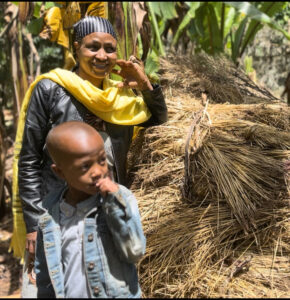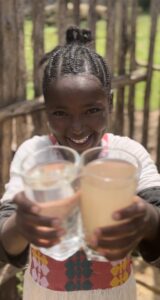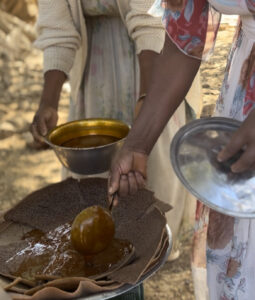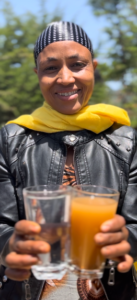We just wrapped up our well site visits in the Sidama region of Hawassa, Ethiopia.
Last year, we visited these very same sites just before they received their new wells.
They have had clean water access for one year, and we are thrilled with the transformation we are seeing among these communities!
One woman named Inhari explained how clean water access has impacted her health and the health of her six children. She passionately expressed that she is now free from the constant worry that her children will get sick from a waterborne illness.
Released from this burden, she is now more peaceful and hopeful for the future. Additionally, with the long walk for water eliminated, she is able to spend more time on her crop production, resulting in an increased income for her household.
Inhari explained how her livestock is producing more milk due to the fact that she has more time to prepare their feed. With her increased time and livestock milk production, she is now able to prepare butter to sell in the local market which has a very high market value in this region.

Inhari proudly posed with the large bundle of feed she had prepared for her cattle.
Of course, there are many stories to share, but one that stands out to me is the transformative story of a young beneficiary named Rohobot. Last year she was quite shy and nervous to speak about her life without clean water access and didn’t quite understand what a well was or how it could change her life. But this year she was all smiles and eager to explain how her life has changed. She has increased her education and is never late to school, her health has improved, and she now has more time to study and play with her friends.
This is amazing news, but it brought a tear to my eye when she told me that Water to Thrive has inspired her. She has clearly adopted a pay-it-forward mentality.
“It is now my goal to become an engineer and give back to those in need as you have given back to us.”

Rohobot
Sulula Community
Sidama, Burra Ethiopia
I have been quite amazed at how quickly clean water access can transform lives! I remember last year when we visited the villages here, they wanted to honor us by providing us with the little food and coffee they had to offer. The people were very kind and hospitable despite the fact that they were struggling to survive with very little.
Thankfully, change is happening quickly in Sidama! This year we have been gifted bread, several types of shiro, popcorn, coffee, and honey! It is clear their lives are becoming ever more abundant!
The WASH training the communities receive when a well is implemented has greatly impacted the health sector of this region. The maternal clinics have reported decreases in typhoid and Malaria cases, which they attribute to the WASH training, which includes information on still water management, reducing the mosquito population.
One of the communities we visited even washed their hands with soap and water before enjoying a hearty meal of injera and shiro with us. This was a surprise because I did not witness this at all on my previous trip last year, so indeed, it was a vast improvement!

Shiro from a local village, placed on top of a large piece in injera.
The water committees within these villages said it has not been a challenge for them to collect the user fee from the well beneficiaries. They also seem to fully understand the importance and purpose of this requirement.
Community health here is flourishing! They are becoming more educated about the importance of sanitation and hygiene, reducing diseases, increasing crop production, and eliminating the generational poverty cycle that has impeded them for many years!
Well beneficiaries are more than grateful for the change that is made possible by Water to Thrive. They are always very expressive in conveying their gratitude and often express how inspired they are that strangers living on the other side of the world not only think of them but donate hard-earned money to make their lives better!
“Please let the donors of this well know that they we are now apart of our family, and that this bond between us can never be broken.”
-Inhari
Betena Community
Shepherd of The Lake Well

Inhari showing the difference in the water quality before and after the well.
Author:
Jamie Morris
Marketing Director
Water to Thrive